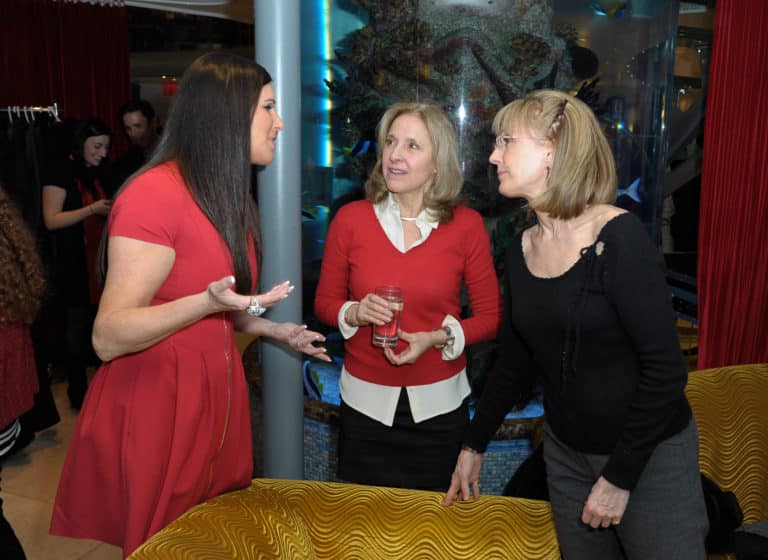
Dr. Helen Fisher and Patti Stanger attends the Match.com Dating Confessions Panel Hosted By Patti Stanger on February 8, 2014 in New York City. Image by Dave Kotinsky/Getty Images.
Singles in America and the Future of Love
Over a third of American adults are single according to recent census data. Helen Fisher’s annual survey of singles aged 18 to 70+ for the online dating website Match.com is full of fascinating insights into the way we date now — and it will leave you with more than a few questions.
“Men are just as romantic as women.” Helen Fisher asserts that men are just as romantic, if not more so, than women. Conventional wisdom, not to mention the relentless media narrative of the woman obsessed with romantic comedies and the commitment-phobic man, seems to suggest otherwise. Surprisingly, the study found that men are:
- More likely to want to move in together sooner: 33% of men would move in after 6-12 months of dating compared to 23% of women.
- (Slightly) more likely to imagine their future with their partner on a first date: 51% of men compared to 48% of women.
And curiously, the 2013 “Singles in America” survey also found that men were more likely to both believe in love at first sight (61% of men compared to 51% of women) and experience love at first sight (43% of men compared to 32% of women).
Conversely, the single women surveyed wanted:
- more time with friends: 64% of women, compared to 55% of men;
- more personal space: 90% of women, compared to 78% of men;
- their own bank account: 78% of women, compared to 68% men;
- to pursue their own hobbies and interests: 93% of women, compared to 88% of men.

The Clooney Effect
In what Helen Fisher is calling “The Clooney Effect” — a reference to George Clooney’s admirable choice of partner, the human rights lawyer and all around awesome woman Amal Alamuddin — the study found that more men are seeking out women who are smart, powerful, and self-sufficient. The study found that:
- 87% of men would date a woman who makes more money;
- 90% of men are OK with a woman asking them out;
- 87% of men would date someone who’s more educated;
- 87% of men would date someone who is more intellectual;
- 86% of men want a confident and self-assured woman.

Online Dating is the New Normal
2015 was the first year the survey measured online daters’ habits against those of offline daters. Fisher and her research partner found that 31% of singles met their last first date online, while 25% met through a friend, and 6% met in a bar or club. This also supports Fisher’s argument that more and more relationships arise out of associational relationships, where hanging out in a group of friends is more normal than the traditional dinner date. Of those surveyed, online daters are more likely to have a full-time job, higher levels of education, and are more likely to want to get married.
Online is becoming more common. And the data behind new dating taboos and practices are fascinating:
- 70% of people on a date find it extremely rude if their dating partner pulls out their phone on a date;
- Texting is changing just how much connection singles crave, and how quickly they expect a response from their partner: 34% percent of 20-somethings expect a response within 10 minutes of sending a text, compared to 31% of 30-somethings, 27% of 40-somethings, 25% of 50-somethings and 14% of 60-somethings — and men expect a response sooner (30% compared to 26% of single women).

The Expanding Pre-Commitment Stage
Perhaps most interesting of all, Helen Fisher is researching what she calls, “the expanding pre-commitment stage.” Singles want to know everything about a person before they commit. They are both more cautious and more hopeful about marriage, and take seriously the task of picking the right partner. Even trends like researching a date before they go out — which 45% of women do and only 33% of men do — is, for Fisher, a good idea from an evolutionary standpoint. Fisher argues that both men and women should collect as much information on a potential partner that one possibly can.
Certainly, you can find fault in the areas where Fisher finds hope. Cautiousness can be seen as callousness, and mining the internet for data on a date could foreclose you to the possibility of really being present and listening to the person (read: actual, not virtual) you’re dating. Ultimately there’s something magnetic about Fisher’s belief in the future of love. And I hope she’s right:
“In the “Singles in America” study that I do with Match.com, we ask them, ‘What must you have in a relationship?’ And, ‘What’s very important?’ And they must have somebody they can trust and confide in. They must have somebody who respects them. They must have somebody who makes them laugh, which actually is very important biologically. Because laughter drives up the dopamine system. It’s very good for you. Laughter’s very good for you. They must have somebody who gives them enough time. And they must have somebody that they find physically attractive.
We are turning inwards. We are trying to build now the most important relationship. And when I ask the questions, like, they’re very in favor of marriage without children. They’re very in favor of children without marriage. They’re very in favor of living together. What they will not tolerate is commuter marriages, people living in separate homes, people living in separate bedrooms. They want total transparency in the relationship. They want to have access to the person’s cell phone. A great many of them would walk out even on a date who hides what they’re saying on their phone or their texts.
I think they’re looking for a really special kind of relationship. 100 years ago, sure, you had a nice husband and that was great. But you also had very profound relationships with your — with all your other people in the local community. And so, the partnership didn’t have the same profound intimacy. Because it wasn’t all you’ve got. Now your partner’s really all you got. And so we want everything in that partnership. So rather than being less serious about that primary relationship, I think we are profoundly more serious about it. I think people are taking this very seriously. There’s never been so many self-help books. There’s never been so many therapies, therapists, and couple’s therapists, and all kinds of support systems.They don’t want to fail. They’ve seen their parents fail. They’ve seen their friends fail. They’re scared of divorce. 67% of singles these days are terrified of the economic and the social and personal fallout from divorce. And we may see a real swing towards really good marriages.”

